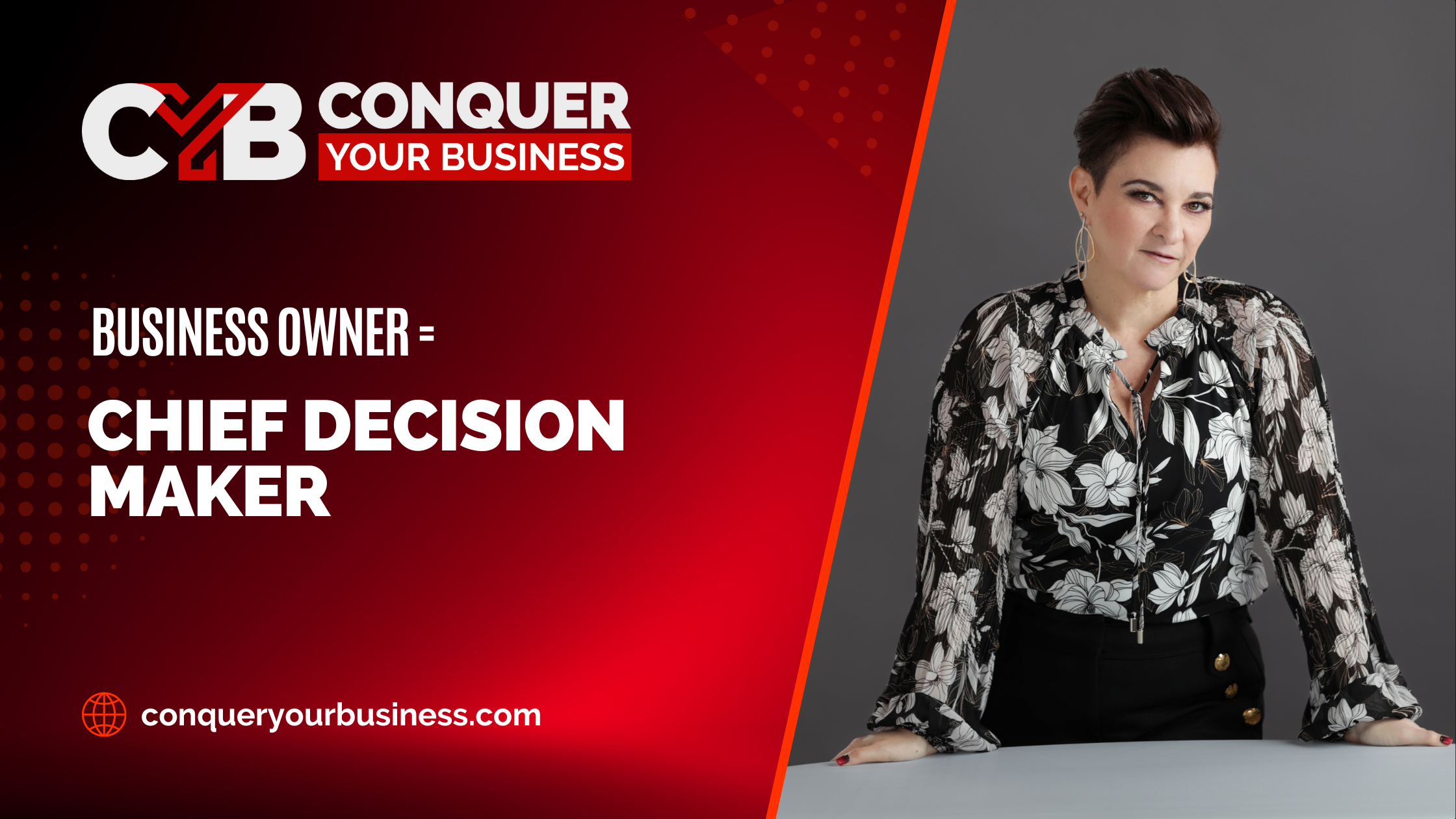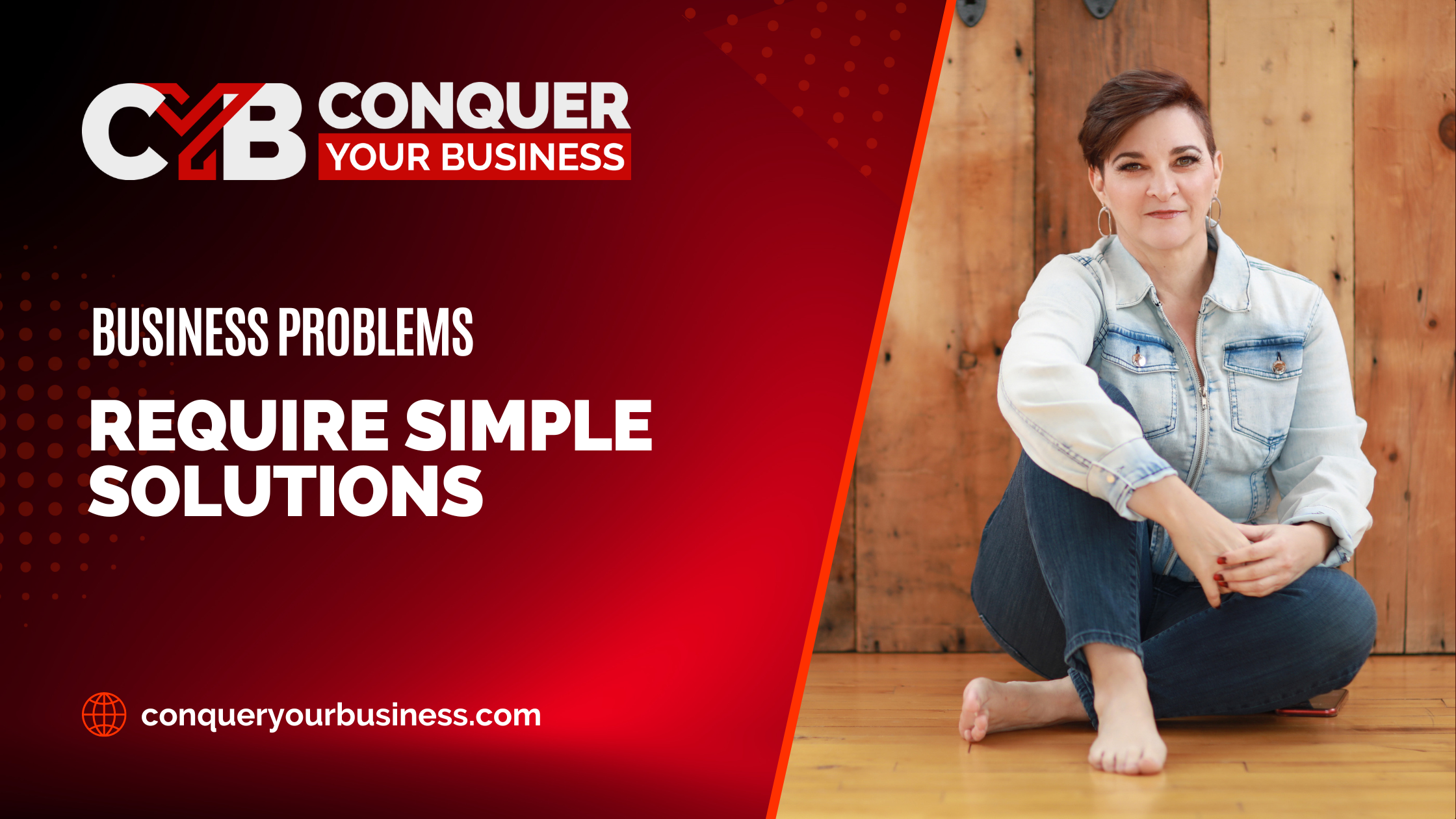There is a book by Goldsmith Marshall titled What Got You Here Won’t Get You There that has been going through my head lately. It was originally written for people in a traditional job setting who were looking to move up the corporate ladder. The author writes about the nuanced behavior that helps or hinders someone in a traditional workplace, such as whether they earn (or do not earn) promotions, the projects to which they get assigned, and their experiences in corporate America.
I have been thinking about this book recently because this same concept applies to business owners, too: What Got You Here Won’t Get You There. When you relate it to growing and scaling your business, and reaching your next-level goals, you realize that this idea of adjusting and tweaking your behavior and strategies should be front of mind all the time.
As a result, we have been doing this at Conquer Your Business. We have been looking at everything we are doing, what we need to adjust, what we need to tweak, all with that mindset that what got us where we are now will not get us to the next level of where we want to go. Because we are working on this in my own business, this article will explore five areas that you can examine in your own business so that you can go from where you are now to where you want to go.
The Changing Economy and Your Business
When the economy changes, people’s buying patterns change. In many households, whether or not there is “extra” money is affected, which means that there are more things that compete for the money that they might spend with you. For example, when gas prices increase, many families spend less money on entertainment and retail purchases. The distance that they need to drive to work does not change, but the amount of money it costs to get to work increases, so they pull back spending on “fun” activities that they can skip.
Currently, we’re in a constricting economy. People are talking about a recession which means that people are taking longer to make purchasing decisions. When decisions are harder to make, it means that clients are either unwilling or unable to spend money on things that used to be affordable. As a result, if you are continuing to do business in a constricting economy the same exact way you did business in a growing economy, you’re going to run into problems.
Being in a constricting economy does not mean that you have to lower your prices. The fact that there is a constricting economy does not mean that there is not any money. Money moves around, but it doesn’t go away. In fact, there’s more money than there’s ever been before, it’s just not all in the same place.
This is why right now is an ideal opportunity to revisit your offers to see if and where you need to make changes. Consider where you need to actually increase your prices to reach the higher level clients that can still afford you. You may need to change the duration of your offer, or the entry point to work with you. There are many different ways that you can adjust the pricing on what you are offering based on what your clients and customers are experiencing. Following our theme of What Got You Here Won’t Get You There, if you have reached your current point in your business during an easier economy, you will need to change what you are doing if you want to continue to grow during a difficult economy.
The Changing Marketplace and Your Business
Along with the changing economy, the marketplace is changing as well. As the market changes, it is important to make sure that what you offer is still in demand. While I was earning my MBA, I read case studies filled with examples of companies who did not change what they offered. They did not change what they were selling, or what they did for clients, as the world changed around them.
Kodak was one of those key case studies, in that they were the pinnacle in photography, and then they were gone. Blockbuster was the pinnacle of entertainment, and now it’s gone. However, Netflix, which originally offered physical DVD rentals by mail, pivoted away from physical rentals to focus on streaming and the production of their own original content, and is still in business. Whether you are a large company or a solopreneur, it is extremely important to consider whether or not what you offer is still relevant to the marketplace, and determine if you need to adjust what you do to remain relevant.
Your Mindset, Habits, and Your Business
The third thing to consider when thinking about What Got You Here Won’t Get You There is to explore your mindset and habits. If you have done any kind of mindset work and have already been working on your mindset and habits, you have heard this before: being an entrepreneur is absolutely the deepest dive into personal development that you will ever go on. The mindset and the habits that you need to launch a business are different from what you need to scale a sustainable, thriving business.
Your subconscious programming and limiting beliefs get sneakier, and sneakier the longer you travel on this entrepreneurial journey. These negative thoughts will sneak in when you least expect them. For those of us who do mindset work, we often get this mistaken thought in our head that we have fixed the problem. But mindset work and staying on top of your habits is not ever finished. That work is something you have to become increasingly vigilant about as you are trying to level up your business and get to the next point. In fact it takes more vigilance in your awareness than when you first started.
Whatever you were paying attention to, and immersing yourself in to get your business launched, don’t stop now. Do not take your foot off that gas. Make sure that your habits and your mindset work are growing in intention with the business that you are trying to build.
Being a Leader Versus Being a Solopreneur
The fourth consideration when thinking about What Got You Here Won’t Get You There is what I call being a leader versus solopreneur. I am thoroughly convinced that becoming a business owner of a scaling business is monumentally harder than launching a business in the first place.
Most of us launch our businesses to be able to do the thing that the business does for a living, because we like doing it, we are good at doing it, and we know how to do it very well. However, scaling a business to the point where there is a team and other people involved in delivering the service is a whole other ballgame! So as you move further into business ownership and into more of a leadership role in your business, you have to learn an entirely different skill set. And honestly, that skill set often has nothing to do with what the business does for a living. Instead, it’s about growing a team, otherwise it is easy to become stuck.
Now, don’t get me wrong, if you want to be a solopreneur – which is a perfectly reasonable option – I am all for it. The important part of remaining a solopreneur is that it be a conscious choice, instead of getting stuck with something because you cannot figure out how to get past it. If you really want to scale a larger business and create a team, there are new skill sets that you will need to learn and embrace. It is completely doable, though. You learned how to launch a business, and you can learn this, too.
Leveraged Marketing to Grow Your Business
The last piece of the puzzle that I want to give to you is about up-leveling your marketing. The way that you did marketing as a solopreneur is often not sustainable for growing your business. If you want to truly scale your business, the way you market your business has to change. Especially from a time commitment, once you become the leader of a scaling business, you need to learn to leverage your marketing efforts.
If you want to grow your business you need to know how to transition your marketing to what I call Leveraged Marketing. This is a more intentional way to actively market to groups of people instead of only one-to-one. Leveraged Marketing means that you need to be able to nurture a connection by creating a client journey as well as touch points along that journey. The word actively is important because Leveraged Marketing goes well beyond simply posting to social media.
While a lot of people may see it on social media, that is not an active marketing activity. Posting to social media is a very passive marketing activity, especially if you are posting-and-ghosting. Social media is a very passive marketing activity because you have no control or influence over who gets to see it. The algorithms are in charge of whether or not a person gets to see it, and you really have no influence over whether or not someone who does see it chooses to interact with you. Odds are, you also do not have information on that person that would allow you to reach out and make it a more active experience.
Leveraged Marketing is all about actively reaching a group of people. We are not just playing “build it and they will come” because that does not work anymore. And while networking and following up one-on-one is still extremely important to maintain that personal network, it gets harder to do when you’re scaling and building a larger business to get to the next level.
Helping You Get From Here to There
Great things do not happen by accident. They happen with intention. I learned years ago that businesses exist to solve problems, and the leader of the business is the chief problem solver. The idea of What Got You Here Won’t Get You There means that as the chief problem solver, your job is to stay out in front of what might hold your business back. The truth is that avoiding a problem is much easier – and usually less costly – than having to solve the problem, in all areas of your business, including your marketing.




